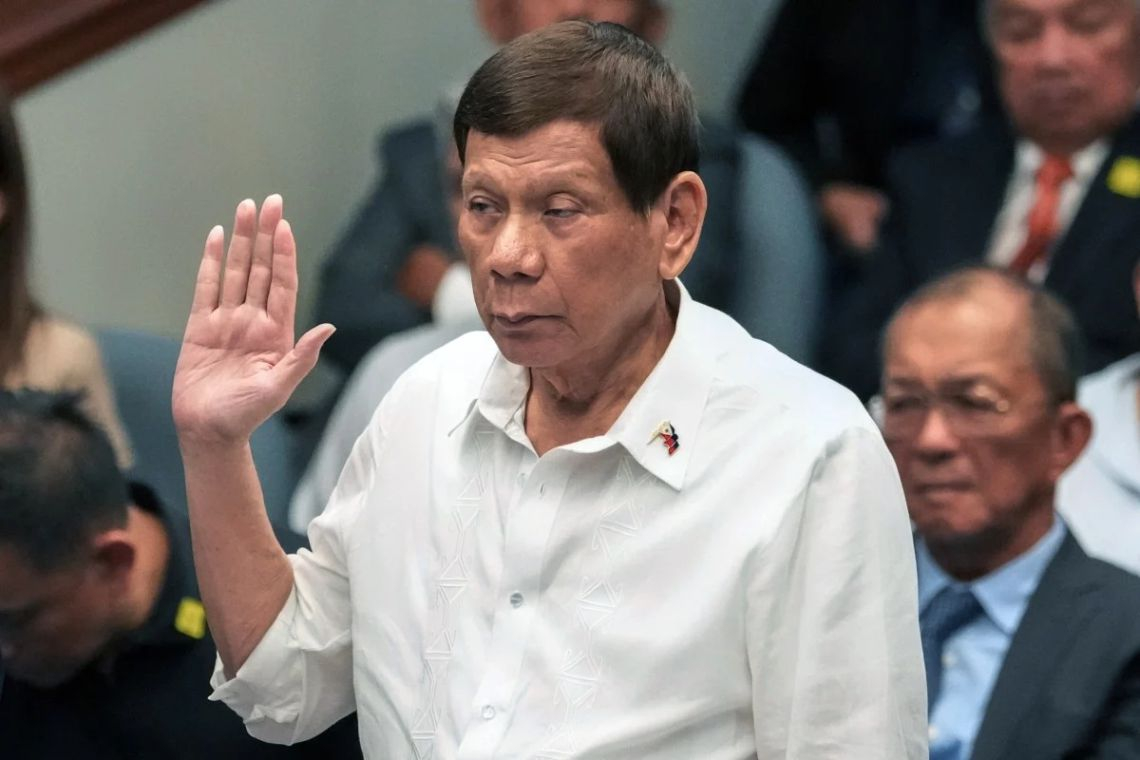During an October (2024) senate hearing, Former President Rodrigo Duterte admitted to using a “death squad.” Duterte has recently been detained by the ICC for his controversial tactics. Image Source: Getty Images
The recent arrest of former Philippine President Rodrigo Duterte by the International Criminal Court (ICC) on March 10, 2025 has ignited intense controversy across the Philippines.
Duterte’s supporters have described this event as a "kidnapping" and an infringement on the Philippines’ internal affairs, rather than a legitimate arrest. However, families and advocates of thousands of extrajudicial killing victims under Duterte’s administration perceive the arrest as a critical step toward achieving justice, long overdue. The divergence reveals deep divisions within Philippine society over justice, international intervention, and political interests.
The Davao Legacy and the Path to the Presidency
Duterte’s approach to governance was first shaped during his two-decade tenure as mayor of Davao City. Numerous media reports and investigations by the Commission on Human Rights of the Philippines raised serious concerns about alleged vigilante operations linked to the so-called “Davao Death Squad.” Despite the gravity of these allegations, Duterte never faced formal criminal charges, instead publicly embracing his harsh anti-crime approach. Widespread national dissatisfaction stemming from unresolved drug trafficking, crime, and political corruption positioned Duterte as an attractive candidate who promised swift, uncompromising action. On the eve of his May 9, 2016, election victory, Duterte solidified his reputation by publicly declaring, “If I make it to the presidential palace, I will do just what I did as mayor. You drug pushers, holdup men, and criminals, you better get out because I’ll kill you.” This rhetoric, widely publicized, foreshadowed the aggressive policies soon implemented nationwide.
Oplan Tokhang, Human Rights Concerns, and Widening Divides
Soon after taking office, Duterte implemented Oplan Tokhang, a program that Philippine authorities described as an aggressive clampdown on suspected drug users and dealers. Reports compiled by Amnesty International and Human Rights Watch detailed thousands of killings under questionable circumstances, particularly in impoverished urban areas. Philippine government officials consistently defended these measures as necessary interventions against widespread drug abuse. However, critics argued they grossly violated human rights standards and due process as well as disproportionately harmed poorer communities.
International tensions escalated in February 2018 when the ICC initiated a formal investigation into Duterte’s war on drugs, citing substantial evidence suggesting potential crimes against humanity. Duterte swiftly responded by announcing the Philippines' withdrawal from the ICC. Although the subsequent Marcos administration upheld this withdrawal, ICC prosecutors continued their investigation, as the court retains jurisdiction over crimes committed prior to a country's official departure from its jurisdiction.
Contradictions in the Call for Foreign Involvement
The ICC’s arrest of Duterte has intensified existing debates surrounding national sovereignty. While Duterte’s supporters strongly oppose the ICC’s jurisdiction, labeling it a foreign intrusion, many within these same groups have hypocritically sought international assistance from bodies like the International Court of Justice, the United Nations, China, and the United States regarding separate political disputes. In particular, leadership within the Sultanate of Sulu underscores this inconsistency, as they have actively petitioned international institutions over their own grievances. The situation reveals a clear paradox: groups that criticize the ICC’s involvement as a violation of sovereignty often actively seek intervention by other international entities when it aligns with their own interests. It also raises concerns that if the Philippine public is displeased with an international court’s investigation into potential human rights offenses, they might be even less receptive to broader foreign influence, such as a renewed U.S. security role reminiscent of a protectorate arrangement.
The situation reveals a clear paradox: groups that criticize the ICC’s involvement as a violation of sovereignty often actively seek intervention by other international entities when it aligns with their own interests.
Online Disinformation and Public Perceptions
The complexities surrounding Duterte’s arrest have been exacerbated by rampant online disinformation, with unverified sources frequently disseminating misleading claims about the ICC’s actions. Social media posts describing the detention as a "kidnapping" have amplified confusion and polarized public discourse. Independent fact-checkers and reputable organizations, including the Commission on Human Rights, Carnegie Endowment for International Peace, Amnesty International, and Human Rights Watch, have consistently countered misinformation, emphasizing the legitimacy of ICC procedures and the documented human rights abuses underpinning Duterte’s indictment.
Duterte's presidency concluded with extraordinarily high approval ratings—peaking around 80 percent—reflecting significant public support derived from perceptions of improved security and decisive governance. His enduring popularity, documented in recent polls showing approximately 58 percent ongoing approval, complicates public acceptance of ICC actions, fueling debates about the court's legitimacy. The political influence of the Duterte family remains substantial, notably through Duterte’s daughter, Vice President Sara Duterte, whose approval ratings frequently match or surpass those of President Ferdinand Marcos Jr. Nevertheless, formal impeachment complaints lodged against her in December 2024, alleging corruption, involvement in plots against the presidency, and complicity in extrajudicial killings during her tenure as Davao mayor, underscore ongoing political volatility and division.
Ongoing Implications
Rodrigo Duterte’s arrest by the ICC serves as a pivotal moment for the Philippines, it may either advance anti-corruption efforts or deepen divisions within Philippine society. Whether the ICC’s intervention ultimately reinforces accountability or exacerbates societal fractures hinges significantly on public perceptions of legitimacy, informed discourse, and the evolving interplay between domestic governance, international law, and foreign interference.
REFERENCES
Amnesty International. (2022, July 15). Philippines: Duterte’s brutal war on drugs must be investigated by the ICC. Amnesty International. https://www.amnesty.org/en/latest/news/2022/07/philippines-duterte-brutal-war-on-drugs-investigated-by-icc/
Calimbahin, C.A.A. (2025, March 10). Polarized opinion: The arrest of Duterte. Carnegie Endowment for International Peace. Carnegie Endowment for International Peace. https://carnegieendowment.org/posts/2025/03/polarized-opinion-the-arrest-of-duterte?lang=en
Human Rights Watch. (2017, March 2). License to kill: Philippine police killings in Duterte’s “war on drugs.” Human Rights Watch. https://www.hrw.org/report/2017/03/02/license-kill/philippine-police-killings-dutertes-war-drugs
Philippine Commission on Human Rights. (2021, December 9). Report on the human rights situation in the Philippines. CHR Philippines. https://chr.gov.ph/report-on-the-human-rights-situation-in-the-philippines/



